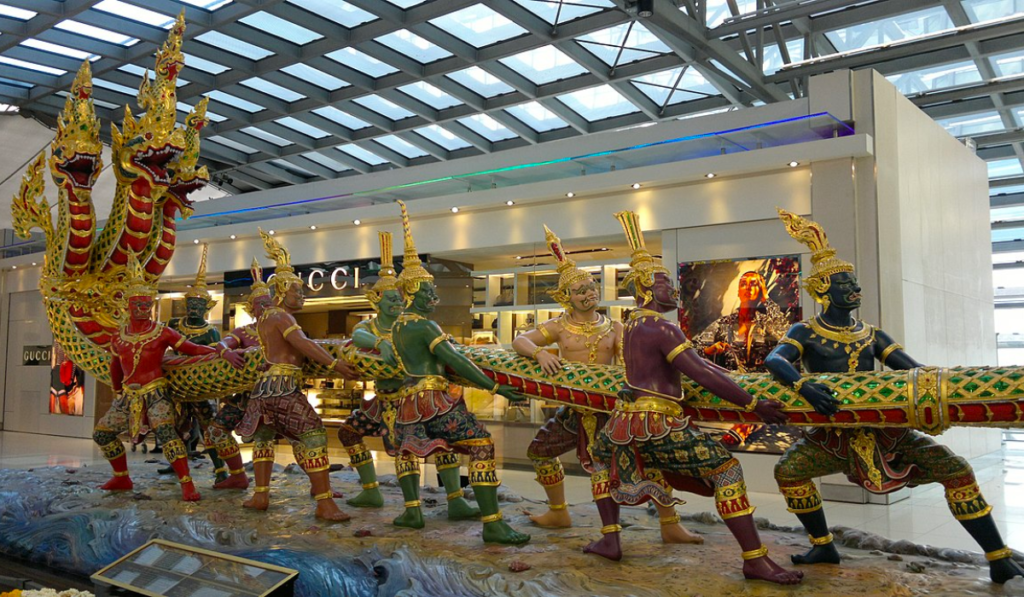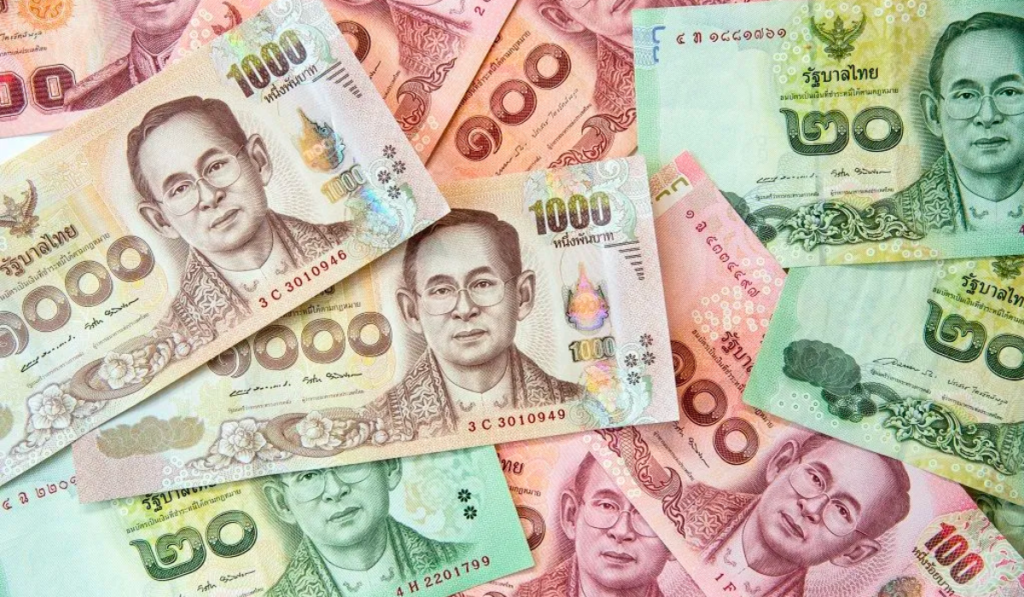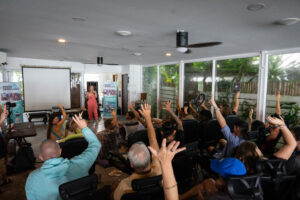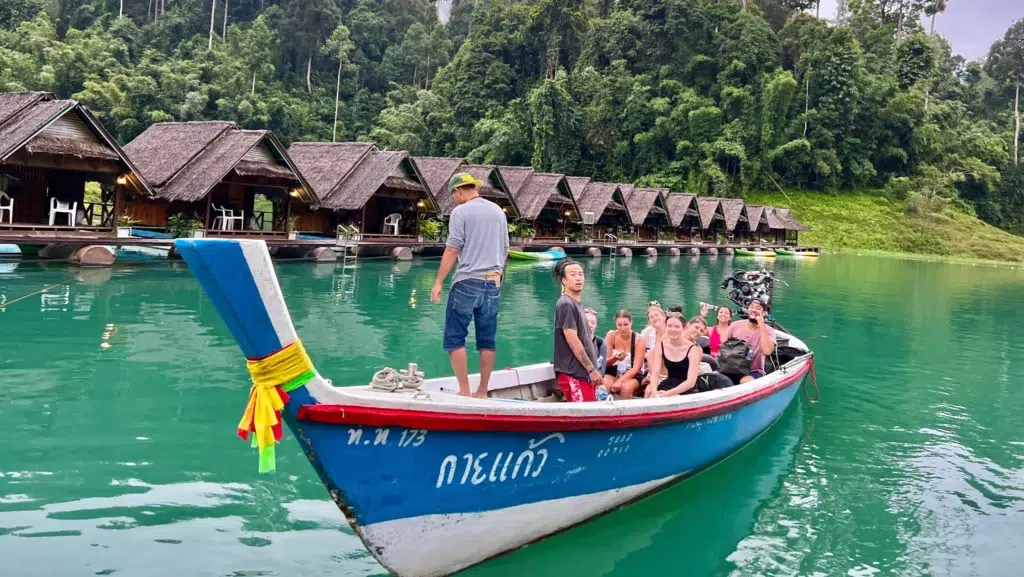Things Every Digital Nomad Needs to Know Before Travelling to Thailand
This is your go-to digital nomad Thailand guide.
We talk about Thailand a lot on here. It is where a lot of our team is based, it’s where we run some of our fantastic tours, and it’s home to some incredible, up-and-coming digital nomad hotspots!
I have been here for two months now and absolutely love it! From the exquisite food to breathtaking scenery to the melting pot of cultures, Thailand truly has something to offer everyone.
Rated as the 8th most popular travel destination in the world for backpackers, holidaymakers, and digital nomads alike, the opportunities for unique experiences, building connections and finding adventures in Thailand are endless. However, there is a lot to learn about this country, especially if you are planning to stay for extended periods to live and work.
Here is a quick overview of some of the things the team and I wish we had known before coming to Thailand. Obviously, make sure you do your own research, but hopefully, this guide will help get you started as you prepare to visit the Land of Smiles!
Entering Thailand
Immigration considerations are the most important thing to research before you even begin your trip. We’ve got a great guide on the different visa options for digital nomads that will explain all the best options available to you.
Make sure you check the exemption list as some citizens of some countries can stay for up to 90 days without a visa! If you want to stay for a long time though, it is better to get a tourist visa rather than using an exemption and relying on extensions and border runs.
If you do decide to go with the exemption route and want to do border runs, then just remember that you can only enter Thailand through land entries twice in a calendar year.
Anecdotally, Thailand seems to be getting stricter with its immigration control, and I know many people who have been stopped at the border upon re-entry. You are less likely to be questioned or refused entry if you have an official visa.
Destination Thailand Visa
Thailand recently launched the Destination Thailand Visa (DTV) specifically aimed at digital nomads and remote workers looking to (legally) live and work in Thailand for extended periods of time.
This is a great opportunity as previously many nomads relied on the tourist visa for entry which technically did not allow you to work while in Thailand…
The visa is very new and many details are still emerging, however, here’s a breakdown of what we know so far:
- Validity: The visa itself is valid for five years, and permits multiple entries.
- Stay Duration: Stays are limited to 180 days, but you can extend for another 180 days with an additional fee of 10,000 bahts.
- Cost: 10,000 baht (around $280USD).
- Requirements: Applicants must be at least 20 years old and show proof of financial stability, and proof of employment.
- Application Process: Details on the application process are still unclear, but it will likely involve Thai immigration offices or embassies abroad.
Keep an eye out as more details emerge on this new visa – you can also check out our ‘Digital Nomad Visa Thailand‘ guide for all the details on Thai visas.

Transport
Thailand has a pretty good transport system throughout the country with affordable options for trains, planes and boats.
Taxis are widely available but be prepared to bargain on the price. Ensure that you download Grab, which is used in many Asian countries instead of Uber. Often the prices on Grab are cheaper than the taxis.
In Bangkok, you can use the metro, which is amazingly cheap and convenient, typically ranging from 10-40 baht depending on how far you need to go.
When looking at long-distance travel, you should be conscious that not all night buses and trains are created equally. I’ve travelled on some that were nicer than some hostels that I’ve booked. On the flip side, when I travelled from Bangkok down to Krabi, I spent 11 hours overnight on a normal bus in an upright seat.
Always read the reviews and ask around to find the best options.
Bikes
To be honest I could do a whole separate post on renting and driving a motorbike around Thailand but for the sake of keeping this guide concise, here are the most important things to know:
They drive on the left – for me as a Brit, this was great, no adjustment needed, but for a lot of you I am sure this will be a change from what you are used to.
Always wear a helmet – it is illegal to drive without one! The roads here are known as some of the most dangerous in the world, with the WHO ranking Thailand as the number 9 country with the highest road traffic death rate.
It pays to be prepared and helmets are such a cheap and easy thing that could literally save your life! But if that’s not enough of a reason, you are way more likely to be pulled over by the police if you aren’t wearing one, so save yourself the hassle and the fine.
Wear closed-toe shoes when driving – no one wants road rash or worse a de-gloving injury (if you don’t know what that is, don’t google it, just trust me on this).
Take pictures and videos of your bike before you leave the rental place to document any existing damage to the vehicle. If you are as forgetful as I am, this is also super helpful to have when you park up and then can’t remember which one is yours in amongst the sea of bikes!
Most places will ask for your passport to be kept as collateral against the bike. Try to bargain for leaving a cash deposit instead as this is much safer for you.

Weather In Thailand
Thailand has a tropical climate and is typically pretty hot and humid year-round – at least by European standards!. It can get a little chilly in the evenings, especially in the north and during rainy/cool season.
Honestly, the weather in Thailand was so confusing to me when I first got here. Because the country is so large the different regions experience rainy and dry seasons at different times. So right now on Koh Phangan, we are bang in the middle of rainy season, but my friends in Chang Mai are enjoying the hot sunny days of the northern dry season.
If you plan to travel around the country, rather than having one solid base, then be prepared for a huge range of weather, and consider keeping a light rain jacket close by!
Money (Thai Currency)
The currency is Thai Baht.
The country mainly uses cash, especially outside of Bangkok and the bigger cities. If places do take cards, they often have a 3% charge.
Many vendors, online and off, only accept cards issued by Thai bank accounts. If you plan on staying long term maybe consider opening a Thaii account as then you will be able to pay via QR code in many shops, bars and restaurants which is very convenient.
ATMs charge you for withdrawals. It is typically about 200 Baht (6 USD) and this can add up quickly. Some banks however offer free withdrawals if you go into the actual bank rather than using the machines outside places like 7/11.

Food and drinks
Food here is generally cheap, with Western food typically being a little more expensive than Thai food. As you’d expect from this part of the world, there are a lot of rice and noodle dishes that go far beyond just pad thai.
The food is delicious, but can be very spicy so bear this in mind! Often, if they see you are a foreigner, the cooks will tone it down for you automatically.
Vegetarian and vegan food can be tricky, especially in more rural areas. There’s often oyster and fish sauce used while cooking, and egg is really popular here, so if you can, try to be flexible. I have found that generally, people are quite willing to help and make accommodations so you can always ask for changes or clarifications on ingredients.
There are however really good veggie options in the more touristy areas, tofu is popular and I’ve also had some great dishes using soy protein. When in doubt, vegetable fried rice or vegetable pad thai are my go-tos.
Staying Connecting With WiFi (For Digital Nomads)
Thailand has incredible 4G and 5G networks, even on its islands. I personally use AIS as I was told they have the best signal across the country, and from what I have seen this is true. I was even able to video call my family back home while in the middle of Cheow Lan Lake in Khao Sok National Park, a notorious digital dead spot.
Don’t buy your sim at the airport, they will overcharge you! You can visit any 7/11, or phone shop and get a 30-day sim card for 200 Baht.
Alternatively, if you don’t want your own sim but still need wifi to work, there are so many options for co-working spaces, and many cafes also offer free wifi to cater for the ever-growing remote working communities.

Cultural Considerations Of Thailand For Nomads
Thailand is a pretty conservative country, so it’s important to dress modestly and be respectful of local customs. This is especially true when visiting temples, official buildings like immigration offices, or anywhere culturally significant.
Make sure your knees and shoulders are covered when visiting these locations, and check whether you should remove your shoes before entering.
Other Tips for Digital Nomads in Thailand
Learn the local language: While English is spoken in many tourist areas, learning some basic Thai will go a long way in helping you connect with locals and navigate your surroundings. Even just a hello (sawasdee + khá/khráp) or thank you (khàawp-khun + khá/khráp) can get you a smile and show your appreciation for the country, its people and their customs
Join a digital nomad community: There are numerous online and offline communities for digital nomads in Thailand. These communities can provide some invaluable support as well as numerous networking opportunities.
Venture outside of the tourist hotspots: Don’t get me wrong, the beaches and temples here are exquisite but Thailand has so much more to offer. If you get the chance, explore the country’s diverse regions and immerse yourself in the local culture.
So there you have it. My need-to-knows before visiting Thailand. This is obviously just a short guide based upon my own journey as a digital nomad in Thailand. Use it to give you an overview of this wonderful country and as a starting point before you embark on your own explorations and experiences.
My last recommendation is just to be patient and open-minded as you explore: Thailand is a different culture with a different way of doing things, but you will have an unforgettable experience.




